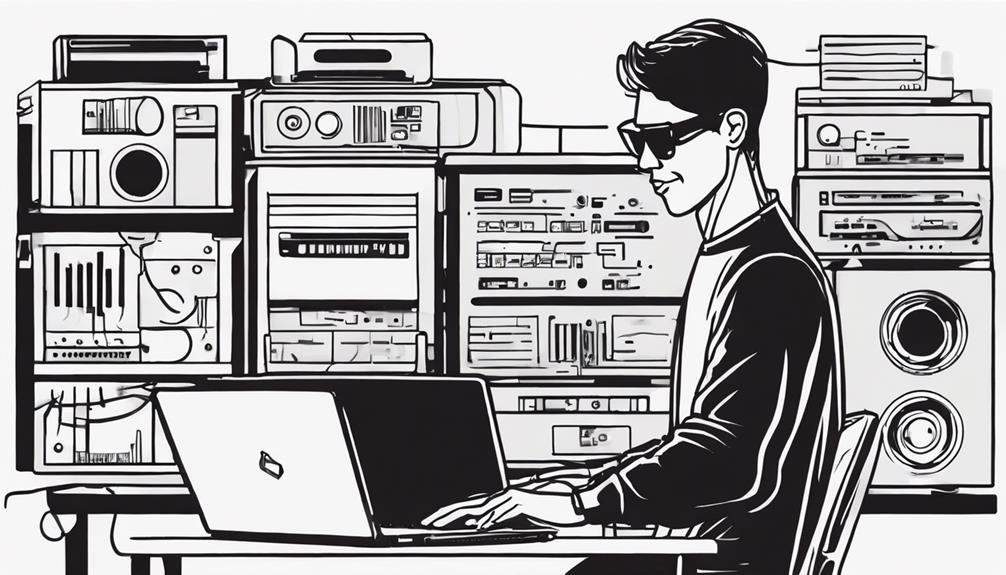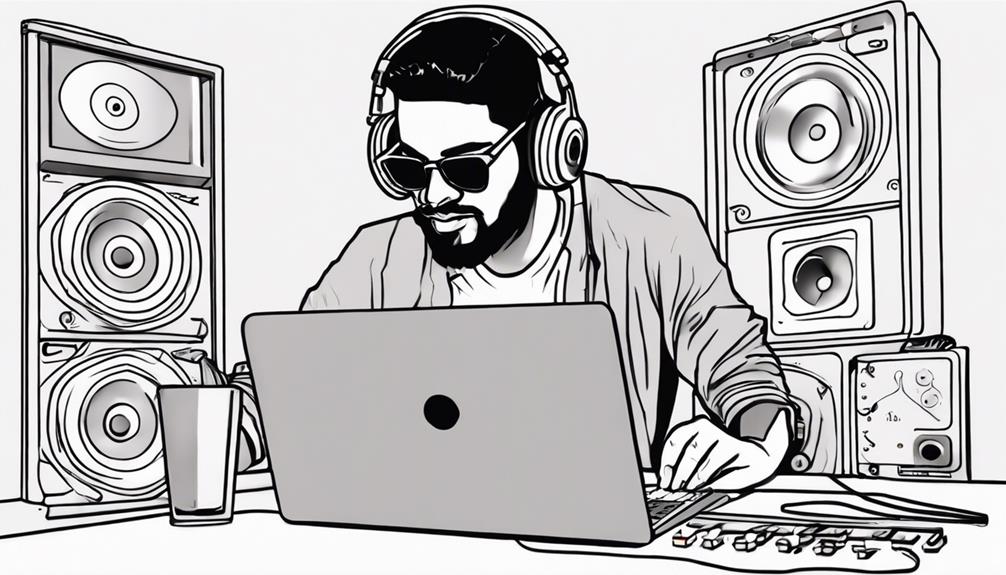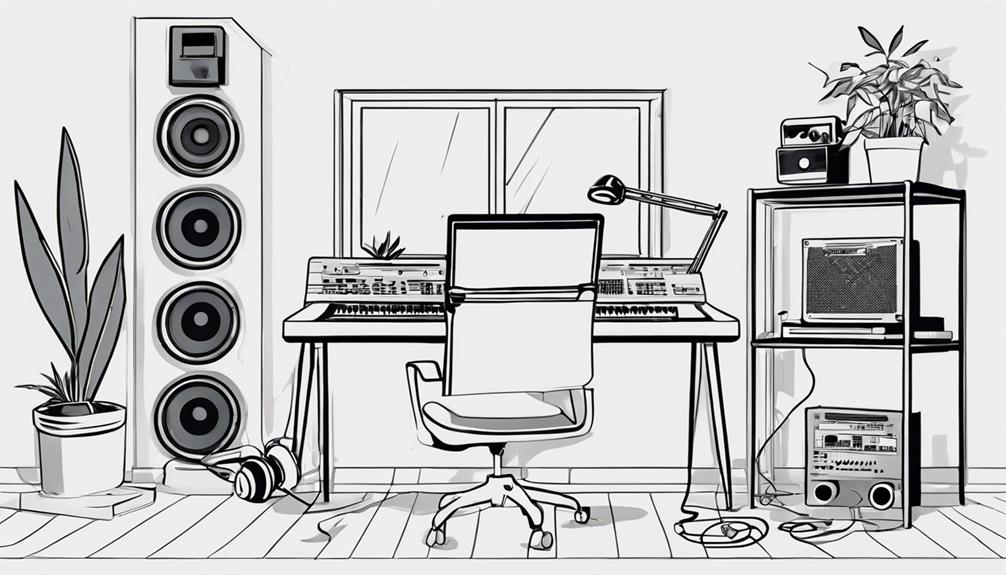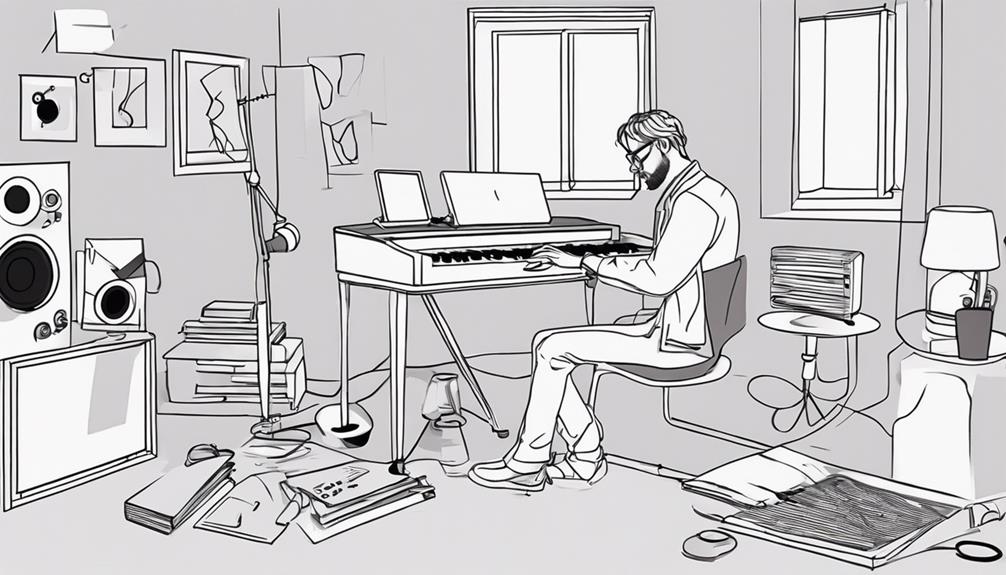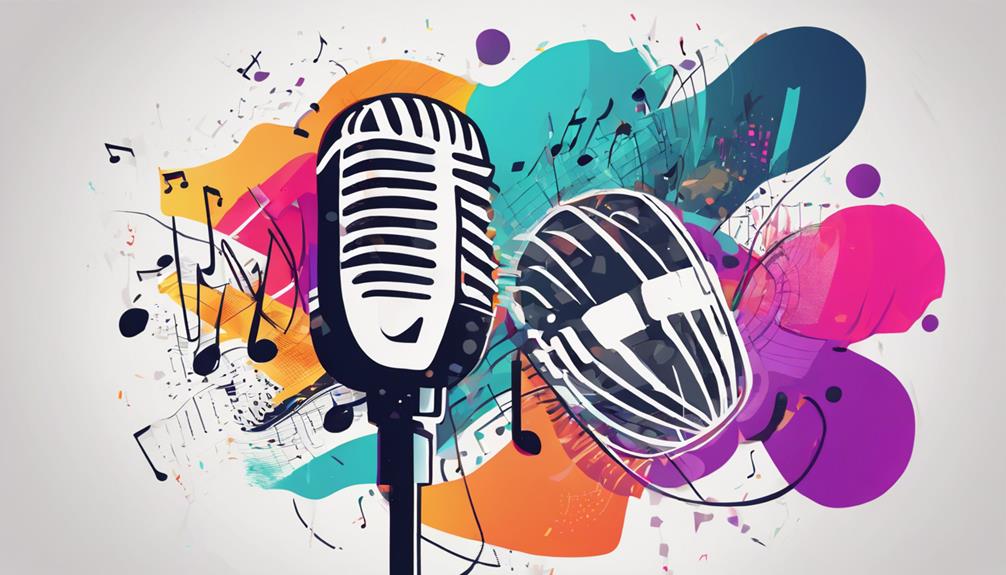Boost your music production capabilities by connecting an external hard drive to expand your storage capacity effortlessly. Select a drive with USB 3.1 Gen2 for faster data transfer. Prioritize larger capacities for extensive music files, considering potential growth. Opt for reliable brands with shock resistance for durability. Backup your music projects regularly, utilizing the external hard drive for secure storage. Remember, choosing the right external hard drive is key to enhancing your music production setup.
Key Takeaways
- Backup music projects regularly to external hard drives.
- Choose reliable, shock-resistant drives for durability.
- Opt for larger capacities for extensive music files.
- Utilize automated backup solutions for data protection.
- Prioritize reputable brands for secure storage solutions.
Compatible Interface Considerations
When choosing an external hard drive for music production, make sure the interface compatibility aligns with your setup's requirements for peak performance. External hard drives come with different interfaces such as USB 3.0, USB 3.1 Gen2, and Thunderbolt.
USB 3.0 is a solid choice, providing a good balance between speed and cost-effectiveness for your music production needs. It offers decent data transfer rates suitable for handling audio files efficiently.
If you require faster speeds for accessing sample libraries and project files, consider opting for an external hard drive with USB 3.1 Gen2. This interface offers quicker data transfer rates compared to USB 3.0, enhancing your workflow by reducing loading times.
For demanding music production tasks that necessitate high performance, Thunderbolt interfaces are ideal. Thunderbolt provides the highest data transfer speeds, ensuring seamless handling of large audio files and resource-intensive projects.
Choosing the Right Capacity
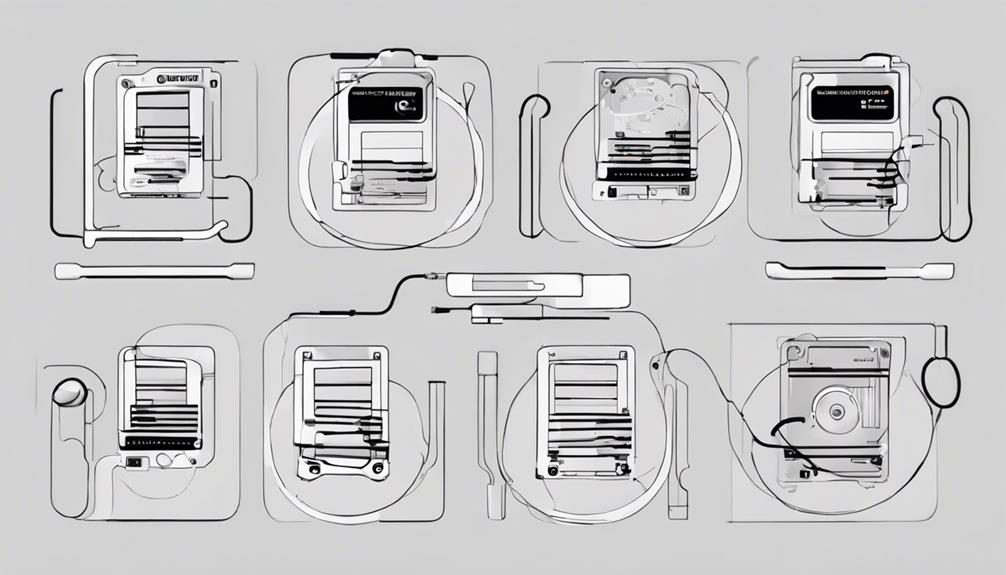
Consider evaluating the size of your sample libraries and projects to determine the ideal capacity for your external hard drive. When it comes to music production, the storage capacity of your external hard drive is vital.
Larger capacity drives like 1TB, 2TB, or even 5TB are great for extensive music files and backups. On the other hand, smaller capacity options such as 250GB or 500GB are more portable and cost-effective for basic storage needs.
It's wise to choose a drive with more capacity than you currently require to accommodate the potential growth of your music production work. By analyzing your storage needs and budget, you can strike a balance between capacity, performance, and cost when selecting an external hard drive.
Prioritizing Reliability and Durability

When choosing an external hard drive for music production, make sure you opt for reputable brands known for their reliability and durability.
Look out for features like shock resistance and sturdy enclosures to protect your data while on the go.
Prioritizing a secure and long-lasting storage solution is key to safeguarding your music projects and creative endeavors.
Reliable Storage Solutions
Prioritizing reliability and durability is essential when selecting an external hard drive for music production to guarantee secure storage for your projects.
When considering reliable storage solutions, keep the following in mind:
- Reputable Manufacturers: Choose external hard drives from well-known manufacturers with a track record for producing reliable hardware. Research user reviews to make sure you invest in a drive that can withstand the demands of music production.
- Shock Resistance and Sturdy Enclosures: Look for drives that offer features like shock resistance and durable enclosures. These qualities are vital for protecting your data, especially when traveling or recording on-the-go.
- Compact and Lightweight Design: Opt for a compact and lightweight external hard drive with a large capacity to store your sample library and music projects. Prioritize portability without compromising on reliability to guarantee convenient use in various settings.
Durable Hardware Choices
Select external hard drives from established manufacturers recognized for their durable hardware to guarantee reliability and longevity in storing your music projects.
When choosing an external hard drive for music production, prioritize durability to assure your valuable data remains safe. Look for features such as shock resistance and sturdy enclosures to protect the drive from physical damage during transportation and use in various environments.
Opt for secure storage options that offer long-lasting performance, supporting years of music projects without compromising on data integrity. Invest in drives that strike a balance between high data transfer speeds, ample storage capacity, and ruggedness to meet the demands of creative work.
Additionally, consider compact and lightweight designs with convenient connectivity options for seamless integration into your on-the-go music production setup. By selecting a durable external hard drive, you can trust in its reliability and focus on creating music without worrying about storage limitations.
Backing Up Your Music Projects
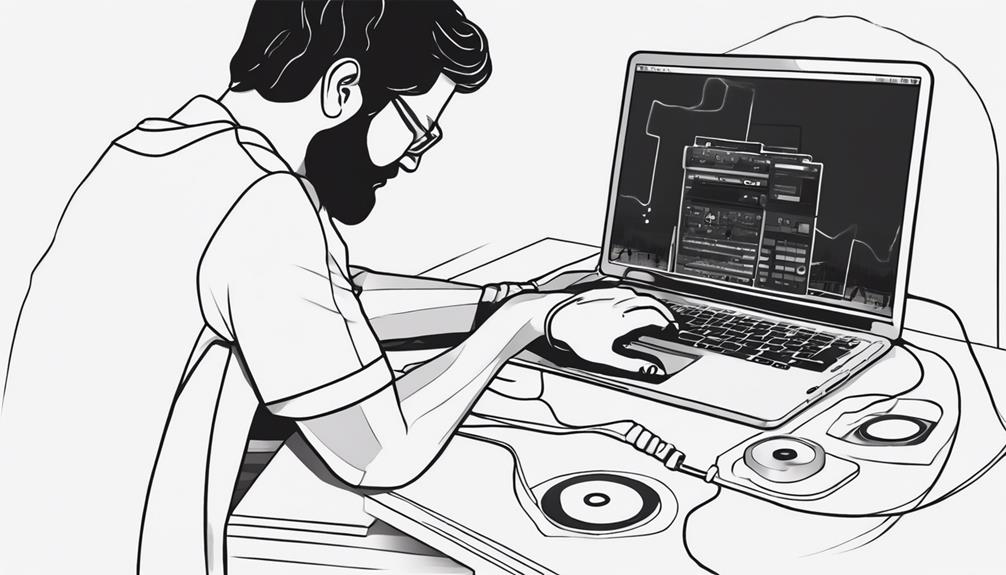
Backing up your music projects is essential to safeguard your hard work from potential data loss.
You need to understand the importance of backups,
explore various backup methods,
and consider automated backup solutions for efficiency.
Importance of Backups
Regularly safeguarding your music projects through backups is crucial in preventing data loss and preserving your hard work. When it comes to backing up your music projects, remember the Rule of Three: have three copies of your files on two different storage mediums, with one copy stored offsite. This strategy guarantees redundancy and protection against potential data loss.
Music producers should prioritize backing up their DAW project files, especially as they near completion, to avoid any unforeseen disasters. Utilizing external hard drives for backup storage is a common practice among music producers, providing a reliable and easily accessible solution for preserving project data.
Backup Methods Overview
To guarantee the safety and accessibility of your music projects, consider various backup methods for effectively preserving your work.
The Rule of Three suggests having data in three places with three file copies on two separate mediums, keeping one offsite for backup.
Regularly backing up DAW project files, especially as projects near completion, is important to prevent data loss.
Utilizing external hard drives for data redundancy and efficient storage of music projects helps prevent performance issues.
Implement dedicated backup drives to secure data recovery in case of system failure or data corruption.
RAID-enabled drives offer additional data redundancy for large studio projects, enhancing data protection and storage reliability.
Automated Backup Solutions
Consider incorporating automated backup solutions into your music production workflow for seamless and reliable data protection. By utilizing scheduled backups to external hard drives, you can guarantee that your music projects are regularly and automatically backed up, reducing the risk of data loss.
Here are three key benefits of automated backup solutions:
- Convenience: With automated backups, you can set up your system to run daily, weekly, or at customized intervals, saving you time and effort while keeping your files safe.
- Peace of Mind: Knowing that your valuable music production files are being backed up automatically to external hard drives provides an extra layer of protection against potential data loss.
- Focus on Creativity: By implementing automated backup solutions, you can concentrate on your music production without the constant worry of losing important projects, allowing you to channel your energy into creative endeavors.
Optimizing Data Transfer Speeds
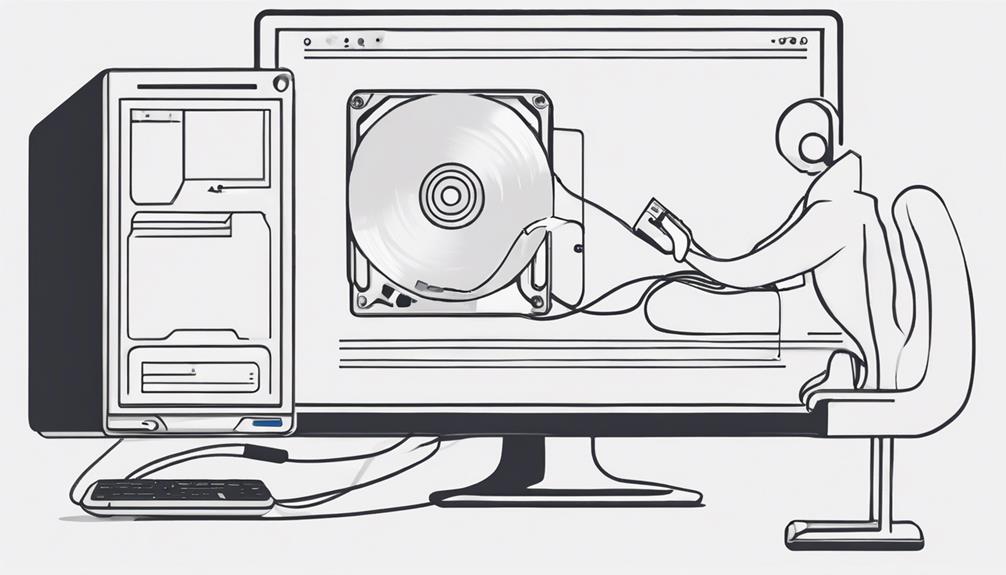
For enhanced efficiency in transferring music files during your production process, prioritize utilizing USB 3.0, USB 3.1 Gen2, or USB 3.2/Thunderbolt interfaces to optimize data transfer speeds. When dealing with large music files, the read/write speeds of your external hard drives play an essential role in maintaining a smooth workflow. Consider investing in SSDs for quicker data access compared to traditional hard drives. To help you visualize the impact of read/write speeds on data transfer, refer to the table below:
| External Drive Type | Read Speed (MB/s) | Write Speed (MB/s) |
|---|---|---|
| SSD | 500 | 450 |
| HDD | 150 | 120 |
| SSHD | 200 | 180 |
| NVMe SSD | 3500 | 2500 |
| Thunderbolt SSD | 2800 | 2100 |
Additionally, make sure your external hard drive is correctly formatted and regularly maintained to prevent fragmentation and guarantee consistent high-speed performance.
Safeguarding Your Creative Work

Enhancing your music production process involves safeguarding your creative work by utilizing external hard drives for secure storage and backup. When it comes to protecting your music projects, external hard drives play an important role in ensuring that your work is safe and easily accessible.
Here's how you can effectively safeguard your creative endeavors:
- Backup Your Samples: Store your sample libraries on external drives to prevent any loss of essential sounds and loops that are important to your music production.
- Secure Storage for Audio Recordings: Keep your audio recordings safe by regularly backing them up on external drives, providing a reliable storage solution for your music files.
- Protect Against Data Loss: By investing in high-capacity external hard drives, you can safeguard your music projects against system failures and potential data loss, ensuring the longevity of your creative work.
Frequently Asked Questions
Should I Use an External Hard Drive for Music Production?
You should definitely use an external hard drive for music production. It expands your storage capacity, prevents performance issues, and offers portability. Opt for an SSD for faster access. Remember, proper setup and maintenance are key for efficient storage management. Additionally, an external SSD for music production helps reduce latency when accessing large sample libraries or project files, ensuring smoother workflows. It also provides a reliable backup solution for safeguarding your important audio sessions. By integrating an external SSD into your setup, you’ll enhance both speed and security for your music production endeavors.
Does an External Hard Drive Increase Storage?
Yes, an external hard drive does increase storage capacity, providing a convenient way to store large music production files. It helps prevent your computer from running out of space and optimizes performance. Get one for seamless data management.
How Do I Use an External Hard Drive as Extended Storage?
Want to expand storage with an external hard drive? Connect it to your computer, format it, transfer files for space optimization, and use it for active projects. Back up regularly to prevent data loss and optimize performance.
How Do I Add Storage to My Computer With an External Hard Drive?
To add storage to your computer with an external hard drive, connect it via USB or Thunderbolt. Your computer will recognize the drive, allowing you to store music files and projects easily. Backup your work for added security.
Conclusion
Now that you've expanded your storage with an external hard drive for music production, you can breathe a sigh of relief knowing your creative work is safe and secure.
Just remember, no amount of storage can protect you from accidentally deleting that perfect track or losing that killer riff.
So back up your backups, and keep creating fearlessly. Your music deserves it.

